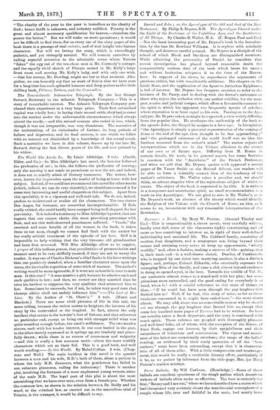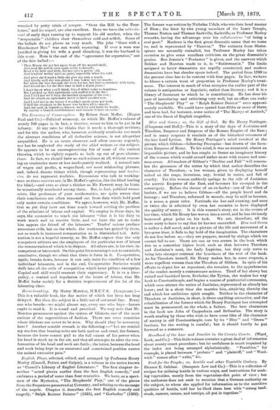Farm, Ballads. By Will Carleton. (Routledge.)—Some of these ballads are
excellent specimens of the rough pathos which American writers of ballads often make so effective. The best is certainly the first," Betsey and I are out," where we have described how a storm which had threatened very seriously clears the matrimonial atmosphere of a couple whose life, true and faithful in the main, had nearly been wrecked by petty trials of temper. "Over the Hill to the Poor- house," and its sequel, are also excellent. Here we have the ne'er-do- weel of early days turning up to support his old mother, when the " respectable " children show themselves cold and selfish. Some of the ballads do not please us very much. The joke "Gone with a Handsomer Man" was not worth repeating. If ever a man was justified in giving his wife a good thrashing, it was the husband in this story. Here is the end of the "agreement for separation," out of the first ballad :— " Then Betsey she got her specs from off the mantel-shelf, And read the article over quite softly to herself ; Read it by little and little, for her eyes is gettin old, And lawyers' writin' ain't no print, especially when Its Cold.
And after shed read a little she give my arm a touch, And kindly said she was afraid I was lowin' her too much; But when sbe was through she went for me, her face a-streamin' with tears. And kissed me, for the first time in half a dozen years I don't know what you'll think, Sir—I didn't come to inquire— But I picked up that agreement and stuffed it in the fire; And I told her wed bury the hatchet alongside of the cow ; And we struck an agreement never to have another row.
And I told her in the future I wouldn't speak cross nor rash, If half the crockery in the house was broken all to smash; And she Raid, in regards to heaven, wed try and learn its worth. By starttn' a branch establishment and runtdn' it here on earth."



































 Previous page
Previous page